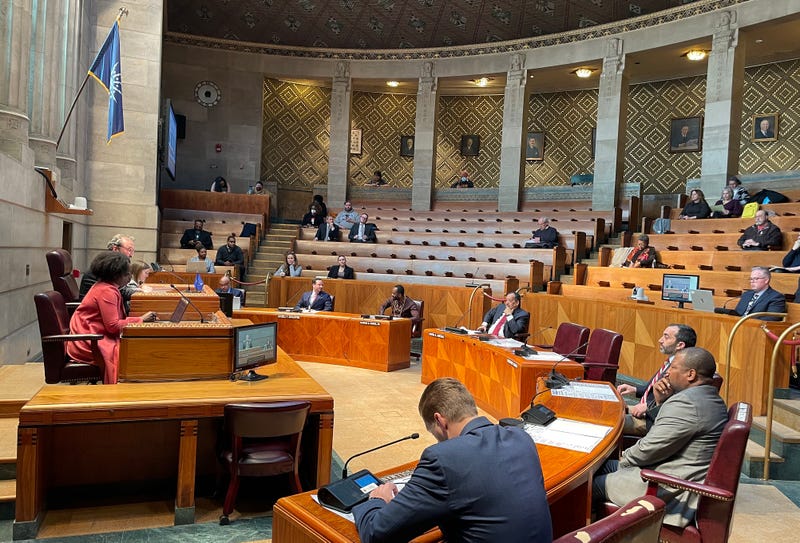
Buffalo, N.Y. (WBEN) - As the natural gas ban debate continues to rage on in Albany between state lawmakers, elected officials in the City of Buffalo continue to search for answers regarding what the proposed bill would entail for their constituents.

During a Buffalo Common Council session last week Tuesday, Feb. 21, Councilmembers discussed a resolution brought to the chamber floor regarding the state's natural gas ban, feeling the proposal has its good intentions, but had not been thought out well enough for State Legislators to push it through into law.
After a brief discussion, Councilmembers filed the resolution for further discussion during the Community Development session one week later.
The resolution was, once again, opened up for discussion on Tuesday in the Common Council chambers at Buffalo City Hall. It was there where Councilmembers got a chance to hear from a number of advocates in attendance in an informal public hearing to try and give a better scope of what the natural gas ban entails.
"Today was organized with people who are for this legislation. There are just as many people who are concerned about it," said Council President Darius Pridgen following the session on Tuesday. "What I do support is the conversation so that people have the correct information. I do agree that our climate is in trouble. I do agree that we do need to look for ways to change the direction that we're going in, in our climate. There are people who are just actually afraid of some of the changes and how it will affect them, and how it will affect them economically, mostly, and how we survive without it, especially in a cold climate like Buffalo, New York. So I think it's good for the conversation so that we get to the correct information."
"Today in the Common Council chambers, we had folks that were energy advocates that really pushed back on any notion of this would harm people," added Councilman Mitch Nowakowski on Tuesday. "I think the Council is taking that into consideration, but we really want to get down to the brass tacks of things, and what does this really mean when it comes to gas stoves and what requirements mean? I think a lot of folks are very apprehensive when there are requirements coming from Albany that they will have to adhere to when they don't have enough information, or are frightened that it might cost them a lot of money to be able to convert. So I think clearing up a lot of misinformation is super important."
It was Councilman Joe Golombek who scripted the resolution ahead of last week's session. He says he was glad he did the resolution, because he feels it's important to bring in experts from New York State and National Grid to be able to provide factual information on the proposed transition that would start in 2025.
"My concern, as a representative of the people of the North District in the City of Buffalo, is that during the last storm, I had, I think, 12 or 14 streets - more than blocks, but streets - that were out of electricity. I want to make sure that something like this does not happen again," said Golombek on Tuesday following the session. "If the grid isn't capable to withstand every house in the City of Buffalo, then they would need to slow down. I mean, I understand, I think it's a good thing to get rid of emissions and things like that, but at the same time, you have a lot of people who are frightened right now that don't understand this, and there's a lot of misinformation that has been out there. That's why I asked for the agencies to come down and explain to us."
The Common Council was originally hoping to have representatives from the State and National Grid be in attendance for Tuesday's session, but they were in attendance for hearings in Albany. Golombek hopes they will be in town two weeks from Tuesday on March 14 to further explain the inner workings of the proposed bill.
After hearing from a number of advocates speak for nearly 45 minutes on the benefits of the proposed bill from New York State, as well as explain what the bill is detailing for the future transition, Golombek says he wasn't surprised with what he heard.
"No, because like I said, I'm not opposed to the use of electricity. I just want it to be done wisely," he said. "I want to make sure that residents and homeowners, and especially the working poor - I have very poor parts of my district - I want to make sure that there's not a huge burden that's placed upon them."
As for Nowakowski, the one thing he heard Tuesday that put his mind more at ease was the conversion upcoming will not be punitive for residents during the process. However, there are still questions that Nowakowski would like to see addressed.
"I know as a councilmember that oftentimes, buildings need to be inspected. So will the municipality be required to force residents for the conversion because they have to adhere to a state law? Once Albany passes these laws, the City of Buffalo has to adhere to it. So a lot of times, our inspections departments need to enforce every single law within the State of New York and in the City of Buffalo. I think that's the piece I need further clarification on," Nowakowski said. "We understand New York State's not coming into your house and saying, 'You need to convert this by 2030.' But when your building's getting inspected in 2030 by city inspectors and you're getting a certificate of occupancy, or you're getting a permit to redo something, is the city or the municipality going to be forced to adhere to the state laws of this conversion?"
When it came to what Council President Pridgen heard on Tuesday, he says he will be doing plenty of research to ensure the truth and clarity for his constituents that have brought up concerns.
"At the end of the day, we know it's the state that is going to make the decision on it, but I think that the heart of the resolution from a colleague was for information. And, I think, there would not be this much attention to it had it not been titled the way it was," Pridgen explained. "I think that for my average constituent, their concern is their gas stove. Their concern is, I mean, let's be real, they're not drilling down about fossil fuels and those things. ... I think there's some correct information, possibly some incorrect information, but at the end of the day, we need the information so that we are able to ease the concerns of our constituents."
As many of the councilmembers have acknowledged over the years, the effects of climate change are real, and it continues to happen to this day. It has become one of the great fights and challenges of this current generation to better address how to handle climate change. However, what Nowakowski would like to see going forward, especially after the upcoming session with energy experts, is the practicality of what this proposed bill and transition means, and how they can put residents' minds at ease.
"If it's shown that this is going to be very applicable and that we can achieve this goal, then I think you're gonna see a lot of support," Nowakowski said. "We really do need to put climate change into the lexicon and the vocabulary of everyday people, but that will only be achieved by having the right messaging, and by having truth and by having facts."
"At the end of the day, and I think Councilmember Golombek said it, I don't think there's a councilman on the floor that doesn't want to see some changes happen so we can save our planet. It's just what those changes are, people understanding them," Pridgen said. "I heard a lot of good information today from the persons who spoke. I, at times, think that people feel it's if/or, or and/but, one way or another, black and white. This isn't black and white. There's a whole lot of gray here, and especially for constituents. They want to know, and that's our job to bring it to them. So at this point, that's all it is, is information."
As talks in Albany continue ahead of the April 1 deadline to finalize the state budget proposal, Golombek feels it will need to take more discussion to be able to properly find a resolution, and bring about more factual information out there to really get a good grasp of what's to come for residents of New York State and the City of Buffalo.
"I think there are a lot of questions that are going to be raised, and I think some of the concerns that people have that on a certain date, we're not going to allow any more gas. That's obviously a fallacy, but we need to get that information out there so that people know what the truth of the matter is," he said.
"Also, I think that if we are ultimately going to go to electricity, one of the things that we're going to have to do is have an incentive and help people. ... Those are the concerns that people have, and we want them to be answered rather than rumors on both sides. New York State can come in here and say, 'Here's what is going to happen, here's what is not going to happen.' Then we'll have them on the record and then we'll know."
Hear more from residents and advocates during Tuesday's Community Development session of the Buffalo Common Council available in the player below:

